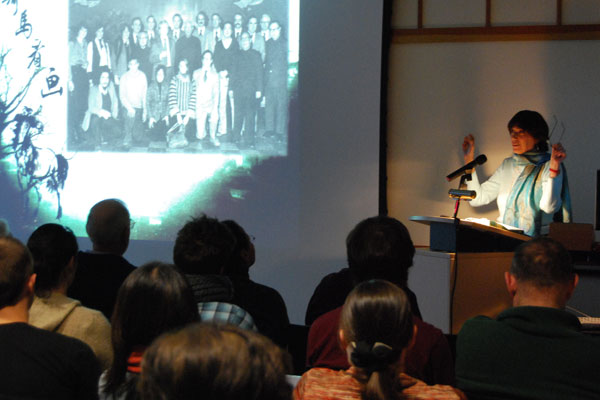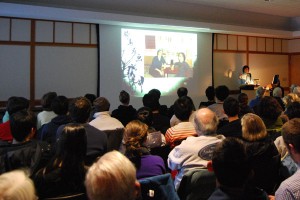Schwarcz Reflects on 30-Year History with China

Thirty years ago, the United States opened its first embassy in the People’s Republic of China as our nation began reestablishing its relations with the country. Vera Schwarcz, professor of history and East Asian studies and director of the Freeman Center, remembers the events well. After all, she was part of them.
Schwarcz, an expert on Chinese culture, politics and literature, was one of only seven official exchange scholars invited to visit China in February 1979 when the embassy opened. Her recollections of this time, and her subsequent 30 years of experiences studying in and about China, served as the foundation for her presentation titled “A Thirty Year Harvest: Personal Reflections on U.S. China Relations.”
Schwarcz’s lecture kicked off Wesleyan’s Mansfield Freeman Center for East Asian Studies semester-long celebration and recognition of the reopening of community country to the western world.
During the lecture Schwarcz shared her insights, inspiration and challenges that have come from her personal relationship with China for the past three decades.
“I went to China as a so-called expert,” Schwarcz says. “I came back as a perennial student.”
Schwarcz was the only western academic with a Ph.D. selected to take part in the cultural exchange of scholars that marked the embassy’s opening. She had earned a bachelor’s from Vassar, her master’s from Yale and did her doctoral work at Stanford University focusing on the Chinese student demonstrations known as the May Fourth Movement of 1919.

Throughout her years of studying and teaching prior to 1979, Schwarcz had been physically close to China—in Hong Kong and in Taiwan—but was never allowed inside the country that she helped interpret and explain to the world. The Chinese did not give the foreign students opportunities to explore day-to-day life in China, except for the manual labor such as wheat harvesting they were expected to participate in, or to take demanding classes but instead cordoned them off in elementary language classes. Schwarcz called it a “holding pen.”
Hand-picked by the U.S. State Department to further their quest to discover “what were the possibilities for scholarly research in China,” Schwarcz “escaped” the confines of the classroom and was able to see China in a way that no Westerner could then and in a more comprehensive way that some haven’t be able to do since that time.
“[U.S. officials intended] to push somebody in there who wasn’t exactly a language student and see if they could wiggle out and within 10 days, I did.” she said.
It may have been her non-western roots—she is the Romanian-born daughter of Holocaust survivors, who grew up in the Eastern Bloc before coming to The United States—that helped Schwarcz most when she began to have more intimate conversations with Chinese people.
“I grew up in a communist country,” she says. “Part of the reason for my own personal harvest in China is that once I got into China, it became very clear that I was not American-born. I think that many of the openings that became available for my oral history research emerged not only because I spoke Chinese but because I grew up in a communist society and there was a level of understanding of what could be said and what could not be said. And that carried me a long way.”
She was among the first Americans to study at Peking University. While there, Schwarcz consciously chose not to have a Chinese roommate where she lived for two years, negotiating a single room that allowed her to have greater access to people and conversations that would likely have more sanitized had she been with a roommate.
Schwarcz was fortunate to be able to meet Zhou Peiyuan, a pre-eminent Chinese physicist and distinguished scientist who studied with Albert Einstein. Professor Zhou told Schwarcz that the May Fourth Movement conference in China was closed to foreigners so Schwarcz’s scholarship took a sharp turn from history to literature, which has only broadened her understanding of Chinese culture.
Marjorie Rivera ’12, who attended the presentation, said that her experiences studying Chinese as a foreign exchange student in China in 2005 echoed what Schwarcz shared.
“The Chinese welcome foreign language students but have a very indirect way of holding them at arms’ length,” Rivera said. “The summer I was in Beijing there was a large conference celebrating China’s openness in allowing foreigners to come to China and study the language. It was held in the Great Hall of the People, and we were all given identical tee shirts and gathered in stifling auditorium while official after official droned on about the importance of learning Chinese in our increasingly globalized world,” she said.
Only 10 years after Schwarcz’s first visit to China she returned to the country with her 5-year-old son in April 1989 as the student protests were escalating. It became a pivotal event in Schwarcz’s life and was important in her quest to gain true understanding of the nation, its people and its government.
During her presentation, Schwarcz reminded the audience that The United States had a relationship with China that predated the establishment of the People’s Republic of China in 1949.
“Around 1949, we purged from the state department every shred of China expertise because to know China was to be soft on China,” she said.
It was this attitude that led to a near complete elimination of communication between the two nations that lasted into the 1970s until then-President Nixon re-opened relations with China. Since then, new partnerships have been established and the countries have moved toward better mutual understanding, but there is still so much about Chinese culture and the Chinese people that remains unknown.
“Piecing together Chinese history and experiences is like creating a whole vase from shards,” she said.
Schwarcz also offered a quote by Confucius that could easily serve as a guiding principle when trying to learn about China, both for her own studies and for The United States as a whole:
” ‘To know what you don’t know constitutes genuine knowledge.’ ”
There will be several other China-related events at the Mansfield Freeman Center for East Asian Studies this semester including:
Exhibition: Rubbings
Open currently through March 6
Gallery Hours: noon to 4 p.m. daily except Mondays
Lecture: The Silk Road: Land and Sea
Michael Yamashita, Photographer National Geographic
Location: Mansfield Freeman Center for East Asian Studies: Seminar Room
Thursday, Feb. 19, 4:30 to 5:30 p.m.
Lecture: Eating Bitterness
The Failure of Maternalist Reform in the Great Leap Famine
Kimberley Manning, Political Science Department, Concordia University, Montreal
Location: Mansfield Freeman Center for East Asian Studies: Seminar Room
Thursday, Feb. 26, 4:30 to 5:30 p.m.
Exhibition Gallery Talk: China Balancing the Changes:
Photographs by Sharon Crain with Patrick Dowdey, Center Curator.
Location: Mansfield Freeman Center for East Asian Studies
Wednesday, April 1 noon to 1 p.m., Exhibition will be ongoing until May 24. Gallery hours are Tuesday through Sunday, noon to 4 p.m.; Closed Mondays.
Lecture: Revolution, Reform, and Faith in the Life of Chinese Actor Ying Ruocheng
Claire Conceison ’86, associate professor of drama, Tufts University, and research associate, Fairbank Center for Chinese Studies at Harvard University
Location: Mansfield Freeman Center for East Asian Studies
Thursday, April 2, 4:30 p.m.
Lecture: My Camera Doesn’t Lie: New Chinese Documentary Film Series
Xinyu Lu, professor and chair of the Broadcasting Department, School of Journalism, Fudan University
Location: Mansfield Freeman Center for East Asian Studies
Thursday, Apr. 9, 4:30 p.m.
Lecture: About Freedom
Zhang Jie, China’s foremost woman writer
Location: Mansfield Freeman Center for East Asian Studies
Thursday, April 23, 4:30 p.m.
Concert: Hearing China
Location: World Music Hall
Sunday, April 26, 7 p.m.
Lecture: Bringing What We Know About China to the Social Sciences: Fieldwork, Research Re(Design) and Theory Building
Kevin O’Brien, Alann P. Bedford Professor of Asian Studies, and Professor of Political Science, University of California, Berkeley
Location: Mansfield Freeman Center for East Asian Studies
Thursday, April 30, 4:30 p.m.
For more information on any of these events and other events not listed contact: Shirley Lawrence, program coordinator at 860-685-2330 or at slawrence@wesleyan.edu. Visit the Freeman Center website at: http://www.wesleyan.edu/east/mansfieldf/mansfield.html. Visit the Wesleyan events calendar at: http://events.wesleyan.edu/.

